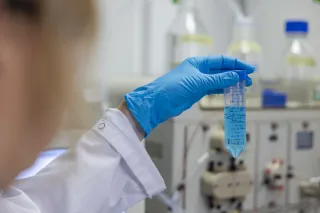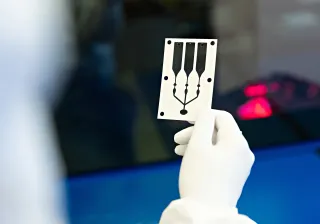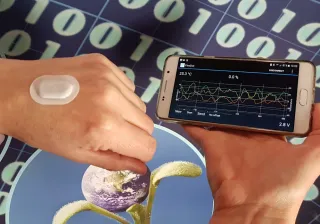The VerSiLiB project coordinated by VTT aims at a completely new method for analysing liquid biopsy samples and tests its suitability for cancer management. The aim is to simultaneously measure both protein and DNA biomarkers in blood with single-molecule sensitivity, which is not possible with current methods. The basic principles of the new method have been verified previously, so the present aim is to develop technology and demonstrate its functionality with clinical samples.
The project ‘Versatile Amplification Method for Single-Molecule Detection in Liquid Biopsy’ (VerSiLiB) develops a reader instrument and test chip that utilise the new analysis method developed and patented by VTT. The method enables simultaneous identification of both protein and DNA biomarkers using a unified analytical method, which is not possible with existing enzyme-based methods. There are plenty of potential applications for this method in medicine. It could be used in a versatile manner for analyses that require information on both proteins and genes. These include viral pandemics, cancers, neurodegenerative disorders, immune diseases, and cardiovascular alterations.
‘The new analytical method is expected to be faster, more accurate and robust than the current methods. It can provide detailed information of the biomarkers’, explains Senior Scientist Sanna Aikio, who is the coordinator of the VerSiLiB project at VTT.
Multidisciplinary project
The project has received a four-year funding from the EU's EIC Pathfinder Open programme. The programme finances revolutionary high-risk and high potential technologies. The VerSiLiB project is implemented as multidisciplinary collaboration between academia, research institutes, clinical partners and companies, combining physics, chemistry, engineering, molecular biology and medicine. The project develops a proof-of-concept reader instrument, a single-use test chip combining photonics and fluidics, and a test chemistry for protein and gene analytics.
VTT plays an important role in the development work. ‘Our experts develop the instrument prototype and low-cost mass manufacturing of the test chip. In the project, we combine VTT's strong expertise in physics, modelling and the development of measuring instruments as well as mass production techniques for large areas’, says Aikio.
Extensive potential in medicine – cancer management as the first application area
The development of the method is at a very early stage. In the long term, it could provide a new medical tool for the simultaneous analysis of protein and DNA biomarkers. The project incorporates a small real-life clinical study on melanoma patients to assess minimal residual disease, e.g. a risky condition that the doctor suspects but has little tools to ascertain.
If the method proves feasible, the commercial product could be ready within 10 years. The analysis method would help to predict the likelihood of cancer progression better than today. For example, one could use the method being developed to intensify therapy in melanoma patients at high risk of poor outcome. Detailed information captured in blood sample would help in selecting personalised treatments, and reduce patient distress caused by prognostic uncertainty.
New business opportunities and innovations
The project's company partners Finnadvance Ltd and Procomcure Biotech GmbH see significant potential in terms of new business opportunities and technological development.
‘This is a ground-breaking project with an enormous potential to accelerate benchside diagnostics. The new method enables rapid diagnostics while opening up new business opportunities for us as a developer of microfluidic test chips’, says Prateek Singh, CEO at Finnadvance Ltd.
‘We are very pleased that the project was funded because this kind of collaboration between the academy and companies is an invaluable driver for innovation and technology maturation’, says Dr Kamil Önder, CEO at Procomcure Biotec GmbH.
The project partners are:
- VTT Technical Research Centre of Finland Ltd, Finland
- AIT Austrian Institute of Technology GmbH, Austria
- Finnadvance Ltd, Finland
- Institute of Physics of the Czech Academy of Sciences, Czech Republic
- Procomcure GmbH, Austria
- The Regina Elena National Cancer Institute, Italy
- University of Catania, Italy
Further information: https://versilib.eu/
The project has been granted funding by the European Union’s European Innovation Council (EIC) under project number 101046217. Views and opinions expressed are however those of the author(s) only and do not necessarily reflect those of the European Union or EIC. Neither the European Union nor EIC can be held responsible for them.






